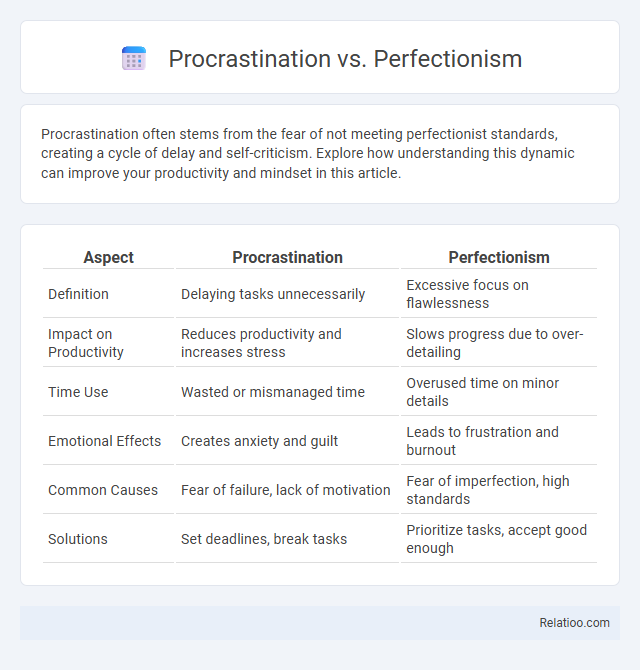Procrastination often stems from the fear of not meeting perfectionist standards, creating a cycle of delay and self-criticism. Explore how understanding this dynamic can improve your productivity and mindset in this article.
Table of Comparison
| Aspect | Procrastination | Perfectionism |
|---|---|---|
| Definition | Delaying tasks unnecessarily | Excessive focus on flawlessness |
| Impact on Productivity | Reduces productivity and increases stress | Slows progress due to over-detailing |
| Time Use | Wasted or mismanaged time | Overused time on minor details |
| Emotional Effects | Creates anxiety and guilt | Leads to frustration and burnout |
| Common Causes | Fear of failure, lack of motivation | Fear of imperfection, high standards |
| Solutions | Set deadlines, break tasks | Prioritize tasks, accept good enough |
Understanding Procrastination: Definition and Causes
Procrastination is the voluntary delay of an intended action despite expecting negative consequences, often driven by fear of failure or perfectionist tendencies. Perfectionism exacerbates procrastination by setting unrealistically high standards, leading to avoidance of tasks to evade potential imperfection. Understanding the psychological roots, such as anxiety, low self-efficacy, and executive function deficits, is crucial for addressing procrastination effectively.
What is Perfectionism? Key Traits and Myths
Perfectionism is characterized by an intense desire to achieve flawlessness and set excessively high standards, often leading to fear of failure and harsh self-criticism. Key traits include an obsession with details, fear of making mistakes, and procrastinating due to the pressure to be perfect. You may mistakenly believe perfectionism drives productivity, but it often causes delays and anxiety, hindering rather than enhancing performance.
Procrastination vs Perfectionism: Core Differences
Procrastination involves delaying tasks due to lack of motivation or fear of failure, while perfectionism centers on setting unrealistically high standards that hinder task completion. You may struggle with procrastination when perfectionism paralyzes your ability to start or finish work because the outcome never feels good enough. Understanding that procrastination is behavioral avoidance and perfectionism is driven by cognitive beliefs about flawlessness helps in addressing their core differences effectively.
How Perfectionism Fuels Procrastination
Perfectionism fuels procrastination by creating an intense fear of making mistakes, leading individuals to delay tasks until conditions seem "perfect." This unrealistic standard increases anxiety and self-doubt, causing avoidance behaviors and extended procrastination periods. Research shows that perfectionists often struggle to start or complete tasks promptly due to their heightened sensitivity to errors and failure.
Psychological Roots Behind Both Behaviors
Procrastination and perfectionism both stem from deep psychological roots tied to fear and self-evaluation. Procrastination often arises from anxiety about failure or decision-making paralysis, while perfectionism is driven by an intense need for control and fear of imperfection. Understanding these underlying mental patterns helps you recognize how avoidance and unrealistic standards contribute to these behaviors.
Common Signs You’re Caught in the Cycle
Common signs you're caught in the cycle of procrastination and perfectionism include persistent delays in starting or completing tasks due to fear of making mistakes. Your work may be repeatedly revised or postponed as you strive for unrealistic standards, causing frustration and decreased productivity. This cycle often leads to increased stress and a sense of being overwhelmed, trapping you in endless loops of inaction.
Impact on Productivity and Mental Health
Procrastination delays task initiation, reducing productivity and increasing stress, while perfectionism causes excessive time spent on details, leading to burnout and diminished output. Both behaviors negatively impact mental health, with procrastination linked to anxiety and guilt, and perfectionism associated with chronic stress and self-criticism. Understanding these dynamics helps develop strategies to improve efficiency and emotional well-being.
Strategies to Overcome Perfectionism and Procrastination
Overcoming perfectionism and procrastination requires targeted strategies such as setting realistic goals, breaking tasks into smaller, manageable steps, and prioritizing progress over flawless outcomes. Cognitive-behavioral techniques like challenging all-or-nothing thinking and practicing self-compassion help reduce fear of failure and perfectionist tendencies. Time management tools, including the Pomodoro Technique and scheduling dedicated work intervals, improve focus and reduce avoidance behaviors linked to procrastination.
Building Healthy Habits for Progress
Procrastination often stems from the fear of imperfection, creating a cycle where delaying tasks hinders your ability to build consistent progress. Perfectionism can paralyze action by setting unattainably high standards, preventing the formation of healthy habits essential for growth. Prioritizing small, manageable steps over flawless execution fosters sustainable habits, helping you overcome both procrastination and perfectionism to achieve steady improvement.
When to Seek Professional Help
When procrastination or perfectionism severely impacts your productivity and mental health, seeking professional help becomes essential. Persistent procrastination may signal underlying anxiety or ADHD, while perfectionism can lead to chronic stress or depression requiring cognitive-behavioral therapy. Your well-being improves substantially with expert guidance tailored to manage these behaviors effectively.

Infographic: Procrastination vs Perfectionism
 relatioo.com
relatioo.com